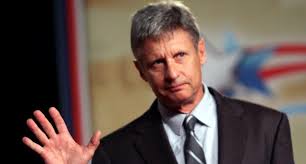| Goodbye 15 percent? Or ... ? When you’re the Libertarian candidate for president, it’s hard enough to be taken seriously, even if you do and say everything right. But in a year when many Americans seem dissatisfied with the Republican and Democratic candidates, Libertarian Gary Johnson has been enjoying unprecedented support (for a Libertarian). |
| | Until Thursday morning. That’s the conventional wisdom, anyway. Don’t be so quick to buy it. MSNBC’s Mike Barnacle stumped Johnson on the Morning Joe program by asking what he would do about Aleppo. “What is Aleppo?” Johnson asked. Social media lit up. Media types chimed in, noting that presidential candidates ought to know immediately where Aleppo is and why the Syrian city is an important flash point in a multi-faceted conflict that is fueling the region’s refugee crisis. Many Americans, however, had to admit that they, too, had never heard of Aleppo. At least, that’s the case with the ones I’ve talked to this morning. Does this matter? Does Johnson no longer have a chance to reach the 15 percent support in polls necessary to be included in presidential debates? Well … First of all, 15 percent is a difficult threshold for Johnson even without Aleppo. And, let’s face it, he’s not going to win the White House in any case — not without some unprecedented changes I can’t foresee. Second, the misstep at least got people talking. Without it, few people would have known Johnson even made an appearance on MSNBC. Now, the nation is abuzz. Phineas T. Barnum is credited with saying, “There is no such thing as bad publicity.” That isn’t always the case, but it might be in this race, where voters seem to be focused on a lot of things other than Aleppo. Political history is full of gaffes, especially since the invention of television. In 1999, George W. Bush stumbled badly when an interviewer from WHDH-TV in Boston asked him to name the leaders of Chechnya, Taiwan, India and Pakistan. He could name only one, the leader of Taiwan. His campaign responded by saying Bush was trying to become president, “not a Jeopardy contestant.” Many voters must have agreed the question was unfair, although it’s difficult to know. Bush lost the popular vote that year, but he won the Electoral College. Then we have this famous gaffe by incumbent President Gerald Ford in a debate against Jimmy Carter: |
But then, Ford was the first Republican to run for president since Richard Nixon resigned in disgrace. Did the gaffe really hurt Ford, or were Americans just not in a mood to reward Republicans in 1976?
And we can’t end this discussion without remembering Vice President Joe Biden’s famous quote from the 2008 presidential campaign, when the nation was in the midst of a financial crisis. He famously told Katie Couric, "When the stock market crashed, Franklin Roosevelt got on the television and didn't just talk about the princes of greed."
Two problems there, of course: Roosevelt wasn’t president when the stock market crashed in 1929, and televisions didn’t invade U.S. homes until after World War II.
Or maybe you can say we just don’t know what fumbling a question about a city in Syria will mean for a third-party candidate in a most unusual year.


 RSS Feed
RSS Feed

